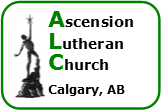Seventh Sunday of Easter
Rev. 22:12-14, 16-17, 20-21
A lesson from Revelation:
[12] “See, I am coming soon; my reward is with me, to repay according to everyone’s work. [13] I am the Alpha and the Omega, the first and the last, the beginning and the end.” [14] Blessed are those who wash their robes, so that they will have the right to the tree of life and may enter the city by the gates.
[16] “It is I, Jesus, who sent my angel to you with this testimony for the churches. I am the root and the descendant of David, the bright morning star.” [17] The Spirit and the bride say, “Come.” And let everyone who hears say, “Come.” And let everyone who is thirsty come. Let anyone who wishes take the water of life as a gift.
[20] The one who testifies to these things says, “Surely I am coming soon.” Amen. Come, Lord Jesus! [21] The grace of the Lord Jesus be with all the saints. Amen.”
You’ll notice that there are some verses left out of this Epistle Lesson from the 7th Sunday of Easter. They are as follows:
“Outside are the dogs, those who practice magic arts, the sexually immoral, the murderers, the idolaters and everyone who loves and practices falsehood” (v. 15) “I warn everyone who hears the words of the prophecy of this scroll: If anyone add anything to them, God will add to that person the plagues described in this scroll. And if anyone takes words away from this scroll of prophecy, God will take away from that person any share in the tree of life and in the Holy City, which are described in this scroll.” (v. 18-19)
I’m sure the committee which complied the lectionary had good reasons for editing the text as they did for this Sunday’s lessons. Minus the verses about those being outside the city of God, and the harsh warnings about adding to or subtracting from the prophecy, the text does have a more upbeat and hopeful tone, which no doubt contributes to a more festal feeling for the 7th Sunday of Easter than if the verses would have been included.
But I think such editing models an unhelpful and even potentially destructive practice—just skipping over the verses that make us feel uneasy, and instead focusing on what we think are the more positive and uplifting passages.
Holy Scripture is God’s word to us, given, guided and transmitted over the centuries by the power of the Holy Spirit. If we edit Scripture to suit our personal taste we are in danger of missing out on something God may be trying to tell us. If we intentionally, deliberately and consistently edit Scripture we run the risk of turning it into a book of our own creation rather than God’s gift to and for us.
Of course, there are portions of the Bible that are troubling and upsetting. Granted, what bothers one may not bother another, but anyone who dares read Scripture intently, thoroughly and prayerfully will sooner or later come across a passage that throws them for a loop. And here’s the secret—that’s ok. Actually, it’s better than o.k.—it’s part of the gift of Scripture. Sometimes the hard passages teach us more about ourselves and God, than the comfortable ones, because they push us to ask questions, dig deeper in other sections of the Bible, seek out others to talk with, and pray.
In short, the hard passages aren’t to be skipped but to be struggled with, trusting that God will guide, direct and provide what we need as we prayerfully engage with His Word, that we might grow in our knowledge and love of our Lord.
